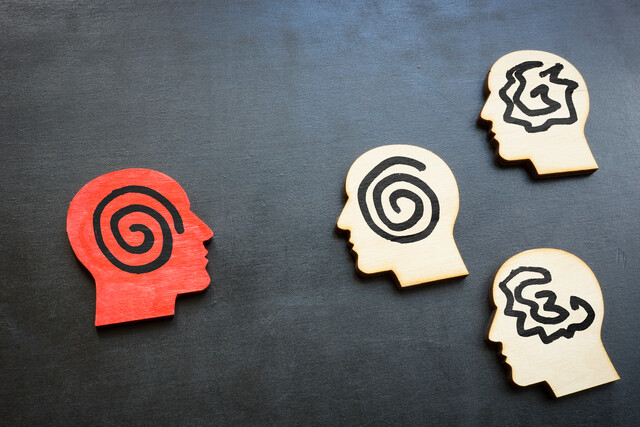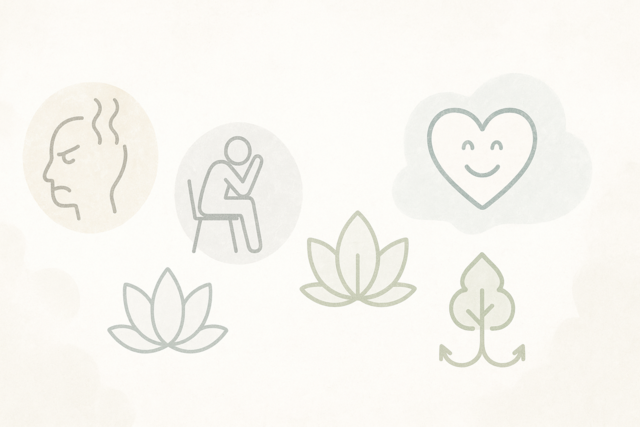?
You sit down fairly relaxed to read a book, but you just can't seem to focus. You get into a comfortable position, get a snack, and yet you are still not quite able to get on track. How can our minds be so restless, not allowing us to solidify a common focus? Every day we are bombarded with so many things that it can be easy to lose focus on what we want to do, and should be doing. We can be busy doing a thousand and one things that are just second nature to us, and we do not utilize one bit of concentration in doing so. It can simply be because of a monotonous routine. We are a generation of multi-taskers, texters, typers, and cell phone users. Everyone can literally reach us in some way, shape, or form, even when we do not want to be reached.
Everyone nowadays is busy, busy, busy. While technology has greatly improved our lifestyles, it can sometimes take away from our natural ability to think things outside ourselves. We no longer proofread documents verbatim; we use spell check. While it may be difficult to pinpoint a single reason that you may not be able to concentrate, you may want to start with your day-to-day routine.
There are constantly various life distractions in our midst, personal situations and things in our immediate environment that affect our ability to concentrate. It is up to each of us to decipher what is holding us back from obtaining the most clear and concise concentration. When we start to take note of our routines, our lives, and the things that may be affecting us, we can begin to change those things appropriately to benefit us in the end.
An enhanced sense of awareness, memory, and overall concentration can lead to success down the road -- in school, in our jobs, and in our personal lives. Distressing and decluttering our minds of unnecessary details and thoughts can help us to clear the way for bigger and better modes of thinking.
Sleep deprivation is another major contributor to a lack of focus;this major lack of proper rest can shut down our mind's ability think clearly. Only you can decide what things you will need to change to accommodate a high level of thinking and focus.
Keeping our wits about us as we get older is an important facet of aging. A sharp mind can mean more independence as we age, or simply an enhanced point of view in the present. Exercising our minds can allow for a more open mind, clearer thoughts, and a stronger focus. What we do with our brains now, will affect its function later. During the aging process, our physical and mental needs change, and it is more important to be healthy overall.
Considering the basic medical benefits of developing and maintaining a healthy habit of exercise or diet, it makes sense that brain function can be improved or worsened due to the activities in one's life. Many people do not realize this, because there is a always a constant focus on weight loss that is associated with exercise and being healthy; however, most can agree that physically fit equals mentally fit. In recent studies, scientists have found a great deal of evidence to support claims that there is a clear connection between brain function and exercise. Therefore, exercising at least three times a week can decrease the risk of certain kinds of dementia and otherneurological conditions, such as Alzheimer's . Many adults between the ages of 62 and 70, who continue working and exercising, seem to have better overall health. Sometimes we wonder why we see someone in their 60s, 70s, and 80s still coming to the office, or other job. Coming to work every day, going to school, or attending classes gives our brains a workout. Our minds stay stimulated, and this is necessary as we age. Stay-at-home moms sometimes miss the adult conversations from their work environment prior to having a baby. Maintaining work relationships and friendships can keep us going. There is always plenty to talk about, and plans to make.The article here is that you are truly only as old as you feel, and maintaining an active lifestyle will certainly create the foundation for a healthier you later on in life.
Many experts believe that by exercising our minds on a regular basis, we can slow the development of age-related problems with our memory. Games that are thought to be beneficial for a more keen brain are Scrabble, cards ,chess, puzzles, and checkers. Any challenging game that requires thinking, and perhaps even strategy, are good candidates for brain games.Although the brain represents only 2 percent of the body weight, it receives 15 percent of the cardiac output, 20 percent of total body oxygen consumption, and 25 percent of total body glucose use. The energy consumption for the brain to simply survive is 0.1 calories per minute, while during problem solving it can be as high as 1.5 calories per minute.
Brain games and brain fitness become more and more important, because of the benefits they provide. It is somewhat like the term, "use it or lose it." If we do not exercise and use our brain function, over time it will certainly decrease. Not to mention maintaining brain fitness also helps us physically, and vice versa. There are some who believe that even concentration on physical activities, without actually doing them, can increase brain health. The thought behind this scenario, is that if you imagine you are running, and focus on the feelings, perhaps take a few deep breaths, etc, how does your body know whether you are really doing the physical activity or not?
Music is an amazing and wonderful gift that always seems to touch us at the right moments and invoke emotions and memories that can last a lifetime. It is through music that we can associate certain times of our life, and fond memories. Music can also create an emotional bond to a certain time period in our lives. So how does music affect our ability to concentrate? Some believe it can actually enhance that ability, and assist us in memory retention.
There is research that suggests music can significantly affect brain function, in particular memory. There was a study conducted on a group of foreign language students, who were able to significantly increase their ability to learn vocabulary items in one day, while listening to a certain type of classical music. Additionally, the study suggests the informationretention rate was approximately 92 percent. This was done with the use of baroque classical music, and it seemed to have very interesting results. The testing also showed that calming, soothing music is ideal. Loud, or disruptive music seemed to have a negative effect on the memory. While this research is based on improving memory, it is important to relate memory and focus to indicate that not all types of music will have the same effect. There is a certain amount of memory and focus used in order to concentrate in the first place. Enhancing any of these areas of your mind, can ultimately lead to stronger, more effective methods of concentration.
There are many proponents of music therapy who find music therapy to have profound effects on the brain and one's ability to concentrate. Some studies indicate that music helps brain circuitry and can increase mental functions. More technically speaking, music therapy is a clinical use of music interventions.
Some uses for music therapy include help with motor skills, social/interpersonal development, cognitive development, self-awareness. This type of therapy is a respected and established service that is quite similar to occupational therapy and physical therapy. Music therapists use music to bring about changes in their patients.
Foods That Help You Think
Many of us have heard the term "You are what you eat." In some cases, what you eat may help or hinder your ability to think! There are various studies that conclude certain foods can give us brainpower, and just as many studies that contain conflicting reports. For years, it has been reported that we should eat carrots to improve and maintain good eyesight, and that milk gives you strong bones. It is so common to hear these theories that naturally we see them as fact; in most cases, these claims have been confirmed by trusted physicians and studies. It is important to know that an overall healthy diet is the way to go. Overdoing any one item to gain the benefit can cause a deficiency in other areas. For example, if you wanted to be "smarter," or increase your capacity for memory function, you would not just eat fish every day, all day, and not have anything else. Instead, you would have well-rounded meals that encompass the nutrients you were trying to get. In addition, if you are unable to eat certain healthy foods, due to a food allergy, comparable substitutes will need to be made.
Food can change the brain's chemistry and, therefore, becomes a highly important part of our brain's function. Research shows that chocolate triggers a happy button in some people. By eating chocolate, the brain will release feel-good endorphins that are good for the entire body. Additionally, it was found that chocolate contains anandamide, which is also produced naturally in the brain. This increases the pleasure factor with eating chocolate -- which has got to be happy news for chocolate lovers!
Typically, as we get older and consider the health of our minds, the threat of Alzheimer's comes into play.This destructive disease is a plague on seniors, and research suggests that the following foods and supplements are essential for brain health -- now and for the future.

























